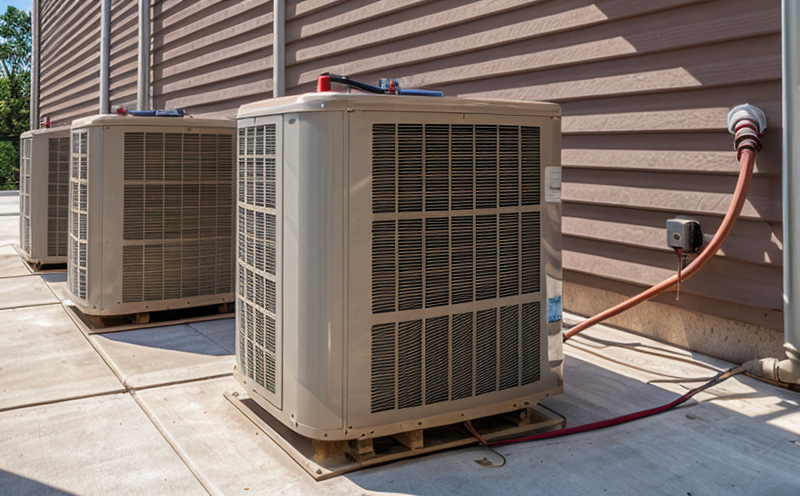ISO 16344 Testing of Building Heat Pumps
The International Organization for Standardization (ISO) has established a comprehensive framework to ensure the performance and reliability of heat pumps used in building HVAC systems. ISO 16344 specifically addresses the testing requirements for these systems, providing guidelines that are essential for quality assurance, compliance, and efficient operation within the built environment.
Heat pumps play a crucial role in modern buildings by providing heating and cooling solutions, thereby enhancing energy efficiency and reducing environmental impact. The ISO 16344 standard ensures that heat pump systems meet stringent performance criteria before installation or commissioning. This is achieved through a series of tests designed to evaluate the system's efficiency, reliability, and durability.
The testing process typically includes both laboratory simulations and on-site evaluations. In laboratories, heat pumps are subjected to controlled environments replicating real-world conditions such as temperature variations, humidity levels, and load cycles. On-site testing involves evaluating performance under actual operating conditions, which helps in identifying any discrepancies between theoretical expectations and practical outcomes.
Compliance with ISO 16344 is not just about meeting regulatory requirements but also about ensuring that the heat pump system operates efficiently throughout its lifecycle. This standard covers various aspects including design verification, installation checks, performance testing, and periodic maintenance recommendations. By adhering to these standards, building owners can be confident that their HVAC systems are reliable and capable of delivering optimal performance.
The implementation of ISO 16344 also supports sustainability goals by promoting the use of energy-efficient technologies in buildings. This contributes significantly towards reducing carbon footprints and supporting global efforts against climate change. Furthermore, compliance with this standard enhances brand reputation among stakeholders who value sustainable practices and high-quality products.
For quality managers and compliance officers involved in selecting or specifying heat pump systems for their projects, understanding the requirements outlined in ISO 16344 is paramount. It provides them with a clear roadmap on how to select suppliers capable of delivering compliant solutions while ensuring that all installation practices align with industry best practices.
R&D engineers working on developing new models or improving existing designs would benefit greatly from familiarity with this standard as it guides innovation towards more efficient and reliable systems. Similarly, procurement professionals can use knowledge gained from studying ISO 16344 to source products that meet not only legal but also functional needs effectively.
In summary, implementing the procedures specified in ISO 16344 ensures consistent quality across different manufacturers and installations, leading to better overall performance of building HVAC systems. Adherence to these standards helps maintain high levels of customer satisfaction by delivering dependable equipment that meets all necessary criteria for safe and efficient operation.
Quality and Reliability Assurance
- Performance Testing: Evaluating the actual performance of heat pumps under specified conditions to ensure they meet expected efficiency levels.
- Installation Checks: Verifying that all components are correctly installed according to manufacturer guidelines and local regulations.
- Maintenance Recommendations: Providing guidance on regular servicing schedules to prolong the lifespan of the system.
- Load Simulations: Subjecting heat pumps to various simulated loads to assess their ability to handle different operational demands.
The rigorous testing procedures outlined in ISO 16344 help maintain a high standard of quality and reliability throughout the lifecycle of building HVAC systems. These tests ensure that only reliable products reach market, reducing maintenance costs and increasing overall system efficiency.
Customer Impact and Satisfaction
The implementation of ISO 16344 has several positive impacts on customers using building heat pump systems:
- Economic Benefits: By ensuring efficient operation, these systems contribute to lower utility bills over time.
- Sustainability: The use of energy-efficient technologies promotes environmental responsibility and reduces carbon emissions.
- Reliability: Meeting rigorous testing standards enhances trust in the product's performance capabilities.
- Customer Satisfaction: Reliable, efficient systems lead to greater customer satisfaction by consistently meeting expectations.
In conclusion, adhering to ISO 16344 ensures that customers receive products and services that are not only legally compliant but also perform exceptionally well in real-world applications. This commitment to quality fosters long-term relationships with clients who appreciate the value added through adherence to international standards.
Use Cases and Application Examples
The application of ISO 16344 spans across various sectors including residential, commercial, and industrial buildings. Here are some specific use cases:
- Residential Applications: Ensuring that homes have properly functioning HVAC systems that contribute to comfort and energy savings.
- Commercial Spaces: Guaranteeing that office complexes or retail spaces maintain optimal indoor climate conditions while minimizing operational costs.
- Industrials: Supporting factories where precise temperature control is critical for production processes.
In each of these scenarios, the adherence to ISO 16344 ensures that heat pumps perform reliably, contributing positively to both individual comfort and broader operational efficiency goals.





